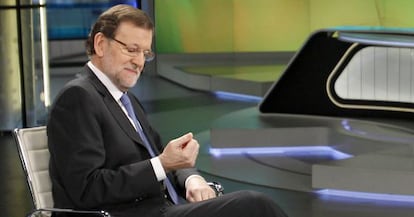“I am convinced of the infanta’s innocence,” Rajoy tells interviewer
PM makes rare TV appearance, defending king’s daughter and abortion reform


In a rare interview given on Monday night to the private TV network Antena 3, Mariano Rajoy made the uncharacteristic gesture of sticking his neck out for someone else. The Spanish prime minister came out in staunch defense of the innocence of Cristina de Borbón, the youngest daughter of King Juan Carlos, who is currently caught up in a tax fraud case involving her husband.
“I am convinced of the infanta’s innocence,” the leader of the center-right Popular Party (PP) said vehemently, when his interviewer noted that corruption has become the second-most-pressing concern of citizens according to the latest poll carried out by CIS, the national center for sociological studies.
Rajoy even went as far as to reject the notion that Cristina should give up her rights to the throne — which would be merely a symbolic gesture, as she is seventh in line of succession — over this case.
“I don’t think she should give them up,” said Rajoy. “I like the fact that we are all equal before the law. The infanta, too, has the right to be presumed innocent. She has been called in to testify — she has not been convicted.”
The infanta, too, has the right to be presumed innocent"
Princess Cristina has become an official target in a lengthy investigation into the dubious business dealings of her husband, Iñaki Urdangarin. The former Olympic handball player is believed to have siphoned off 5.8 million euros of public money through a non-profit he ran with a business associate. After winning no-bid contracts from the governments of Valencia and the Balearics for sports and tourism events that they overcharged for, the partners allegedly funneled a lot of that money to private companies for their own use. One of these companies was Aizoon, owned jointly by Urdangarin and his wife Cristina, who used company funds for private expenses. The investigating judge, José Castro, from Palma de Mallorca, wants to question the princess in connection with Aizoon to determine whether she was involved in any wrongdoing and as such should be prosecuted.
“I am convinced that things will go well for her,” said Rajoy. Asked whether he believed the matter would reach the trial stage, the Spanish leader replied: “No, it’s just that I’m convinced of her innocence.”
Rajoy explained that he has spoken with King Juan Carlos, as he does every week, and that the latter is concerned over this issue. “The king is hurt by these things. I see him very frequently and he is always there on the frontlines, keeping abreast of what is going on in Spain and helping out with a number of very useful things.”
The monarchy’s popularity ratings have been dropping since April 2012, when the media found out that Juan Carlos went on an unpublicized elephant hunt in Botswana, where he fell and broke his hip. Since then, the 76-year-old monarch has undergone a series of surgeries that have raised the issue of whether he should hand the crown over to his son Felipe.
During the interview, Rajoy was visibly more comfortable discussing economic issues than political and social controversies, yet it was inevitable that his government’s abortion reform should come up. The PP wants to eliminate abortion on demand during the first trimester, as established by the previous Socialist administration, and go back to making abortion illegal save in specific cases, such as rape. But this time, the legislation would be even more restrictive, prohibiting women from terminating their pregnancies even if the fetus has severe congenital defects.
“Why did you wade into this quagmire?” enquired the interviewer, in reference to the national and international controversy created by the planned legislation, which has been approved by the Cabinet. In his response, Rajoy suggested that the text may not be as open and shut as Justice Minister Alberto Ruiz Gallardón, sponsor of the reform, claims it to be.
“Abortion reform was on our electoral program. We introduced a project, and now it has to be reviewed by several agencies. It is our intention to reach the greatest possible consensus with those who are willing to build,” Rajoy said.
Tu suscripción se está usando en otro dispositivo
¿Quieres añadir otro usuario a tu suscripción?
Si continúas leyendo en este dispositivo, no se podrá leer en el otro.
FlechaTu suscripción se está usando en otro dispositivo y solo puedes acceder a EL PAÍS desde un dispositivo a la vez.
Si quieres compartir tu cuenta, cambia tu suscripción a la modalidad Premium, así podrás añadir otro usuario. Cada uno accederá con su propia cuenta de email, lo que os permitirá personalizar vuestra experiencia en EL PAÍS.
¿Tienes una suscripción de empresa? Accede aquí para contratar más cuentas.
En el caso de no saber quién está usando tu cuenta, te recomendamos cambiar tu contraseña aquí.
Si decides continuar compartiendo tu cuenta, este mensaje se mostrará en tu dispositivo y en el de la otra persona que está usando tu cuenta de forma indefinida, afectando a tu experiencia de lectura. Puedes consultar aquí los términos y condiciones de la suscripción digital.








































